Legal System for Business Law
VerifiedAdded on 2022/12/23
|10
|2487
|61
AI Summary
This report provides an overview of the legal system for business law, covering classifications of law, sources of law, and the UK law making process. It also explores employment law and the statutory duties of employers to their employees.
Contribute Materials
Your contribution can guide someone’s learning journey. Share your
documents today.
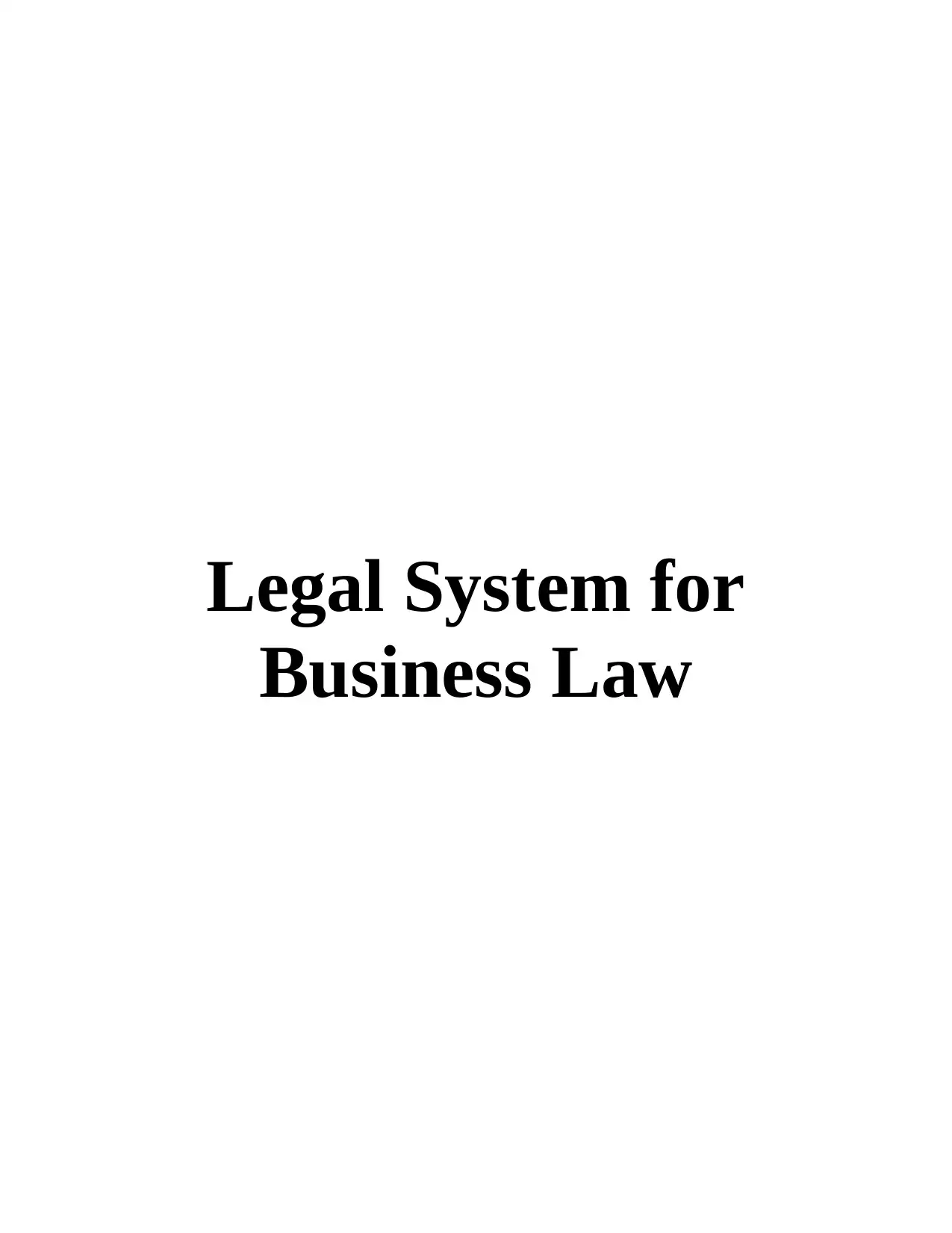
Legal System for
Business Law
Business Law
Secure Best Marks with AI Grader
Need help grading? Try our AI Grader for instant feedback on your assignments.
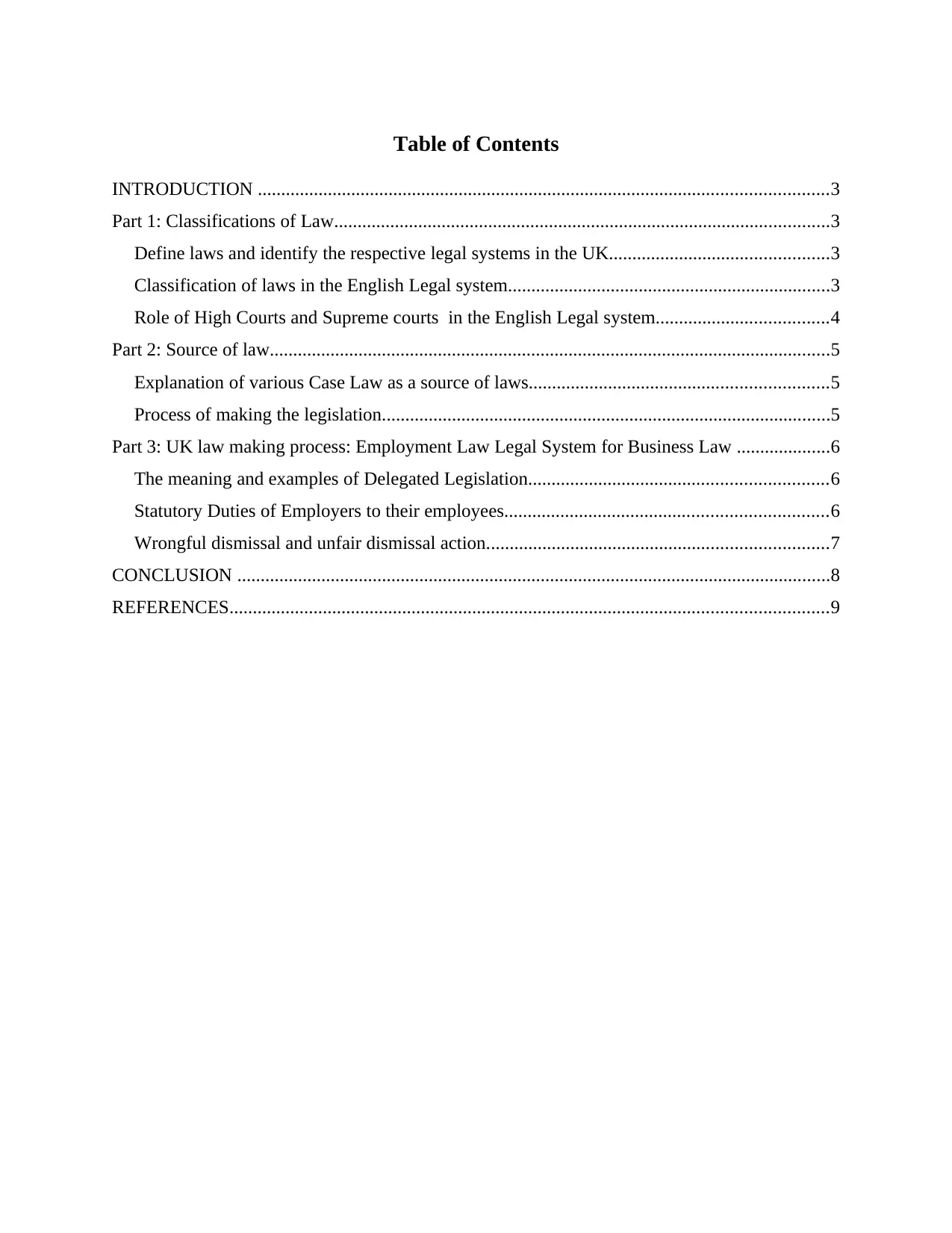
Table of Contents
INTRODUCTION ..........................................................................................................................3
Part 1: Classifications of Law..........................................................................................................3
Define laws and identify the respective legal systems in the UK...............................................3
Classification of laws in the English Legal system.....................................................................3
Role of High Courts and Supreme courts in the English Legal system.....................................4
Part 2: Source of law........................................................................................................................5
Explanation of various Case Law as a source of laws................................................................5
Process of making the legislation................................................................................................5
Part 3: UK law making process: Employment Law Legal System for Business Law ....................6
The meaning and examples of Delegated Legislation................................................................6
Statutory Duties of Employers to their employees.....................................................................6
Wrongful dismissal and unfair dismissal action.........................................................................7
CONCLUSION ...............................................................................................................................8
REFERENCES................................................................................................................................9
INTRODUCTION ..........................................................................................................................3
Part 1: Classifications of Law..........................................................................................................3
Define laws and identify the respective legal systems in the UK...............................................3
Classification of laws in the English Legal system.....................................................................3
Role of High Courts and Supreme courts in the English Legal system.....................................4
Part 2: Source of law........................................................................................................................5
Explanation of various Case Law as a source of laws................................................................5
Process of making the legislation................................................................................................5
Part 3: UK law making process: Employment Law Legal System for Business Law ....................6
The meaning and examples of Delegated Legislation................................................................6
Statutory Duties of Employers to their employees.....................................................................6
Wrongful dismissal and unfair dismissal action.........................................................................7
CONCLUSION ...............................................................................................................................8
REFERENCES................................................................................................................................9
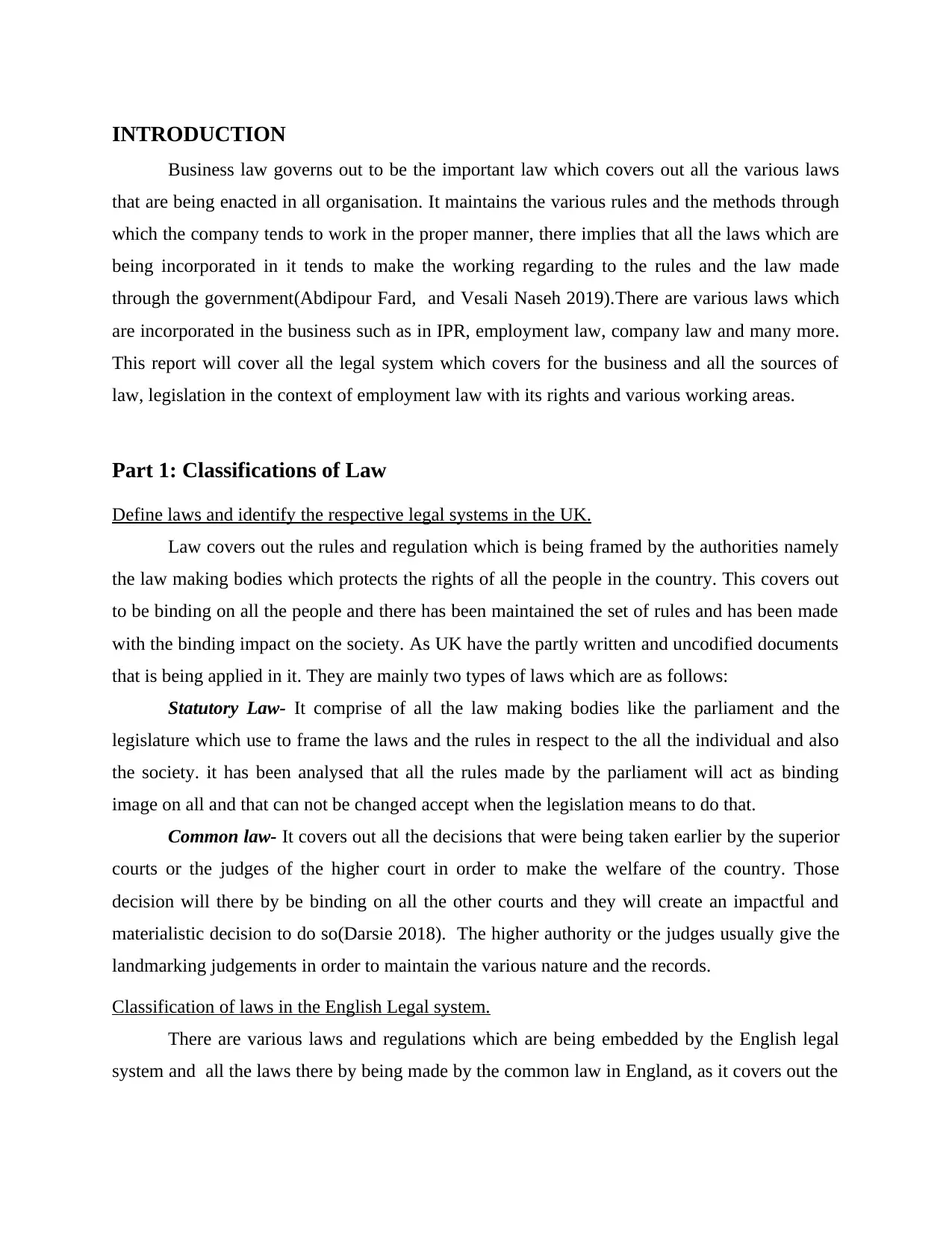
INTRODUCTION
Business law governs out to be the important law which covers out all the various laws
that are being enacted in all organisation. It maintains the various rules and the methods through
which the company tends to work in the proper manner, there implies that all the laws which are
being incorporated in it tends to make the working regarding to the rules and the law made
through the government(Abdipour Fard, and Vesali Naseh 2019).There are various laws which
are incorporated in the business such as in IPR, employment law, company law and many more.
This report will cover all the legal system which covers for the business and all the sources of
law, legislation in the context of employment law with its rights and various working areas.
Part 1: Classifications of Law
Define laws and identify the respective legal systems in the UK.
Law covers out the rules and regulation which is being framed by the authorities namely
the law making bodies which protects the rights of all the people in the country. This covers out
to be binding on all the people and there has been maintained the set of rules and has been made
with the binding impact on the society. As UK have the partly written and uncodified documents
that is being applied in it. They are mainly two types of laws which are as follows:
Statutory Law- It comprise of all the law making bodies like the parliament and the
legislature which use to frame the laws and the rules in respect to the all the individual and also
the society. it has been analysed that all the rules made by the parliament will act as binding
image on all and that can not be changed accept when the legislation means to do that.
Common law- It covers out all the decisions that were being taken earlier by the superior
courts or the judges of the higher court in order to make the welfare of the country. Those
decision will there by be binding on all the other courts and they will create an impactful and
materialistic decision to do so(Darsie 2018). The higher authority or the judges usually give the
landmarking judgements in order to maintain the various nature and the records.
Classification of laws in the English Legal system.
There are various laws and regulations which are being embedded by the English legal
system and all the laws there by being made by the common law in England, as it covers out the
Business law governs out to be the important law which covers out all the various laws
that are being enacted in all organisation. It maintains the various rules and the methods through
which the company tends to work in the proper manner, there implies that all the laws which are
being incorporated in it tends to make the working regarding to the rules and the law made
through the government(Abdipour Fard, and Vesali Naseh 2019).There are various laws which
are incorporated in the business such as in IPR, employment law, company law and many more.
This report will cover all the legal system which covers for the business and all the sources of
law, legislation in the context of employment law with its rights and various working areas.
Part 1: Classifications of Law
Define laws and identify the respective legal systems in the UK.
Law covers out the rules and regulation which is being framed by the authorities namely
the law making bodies which protects the rights of all the people in the country. This covers out
to be binding on all the people and there has been maintained the set of rules and has been made
with the binding impact on the society. As UK have the partly written and uncodified documents
that is being applied in it. They are mainly two types of laws which are as follows:
Statutory Law- It comprise of all the law making bodies like the parliament and the
legislature which use to frame the laws and the rules in respect to the all the individual and also
the society. it has been analysed that all the rules made by the parliament will act as binding
image on all and that can not be changed accept when the legislation means to do that.
Common law- It covers out all the decisions that were being taken earlier by the superior
courts or the judges of the higher court in order to make the welfare of the country. Those
decision will there by be binding on all the other courts and they will create an impactful and
materialistic decision to do so(Darsie 2018). The higher authority or the judges usually give the
landmarking judgements in order to maintain the various nature and the records.
Classification of laws in the English Legal system.
There are various laws and regulations which are being embedded by the English legal
system and all the laws there by being made by the common law in England, as it covers out the
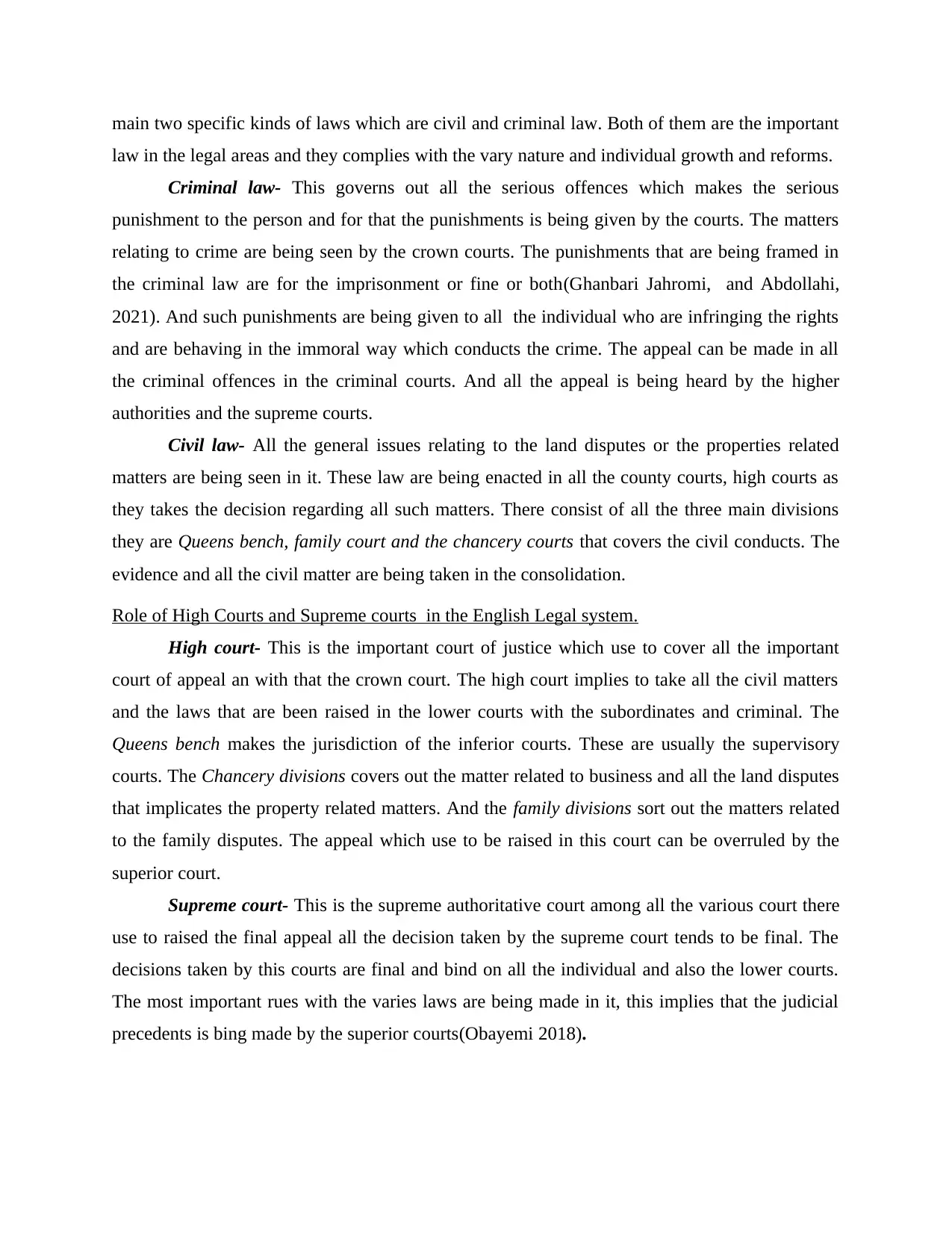
main two specific kinds of laws which are civil and criminal law. Both of them are the important
law in the legal areas and they complies with the vary nature and individual growth and reforms.
Criminal law- This governs out all the serious offences which makes the serious
punishment to the person and for that the punishments is being given by the courts. The matters
relating to crime are being seen by the crown courts. The punishments that are being framed in
the criminal law are for the imprisonment or fine or both(Ghanbari Jahromi, and Abdollahi,
2021). And such punishments are being given to all the individual who are infringing the rights
and are behaving in the immoral way which conducts the crime. The appeal can be made in all
the criminal offences in the criminal courts. And all the appeal is being heard by the higher
authorities and the supreme courts.
Civil law- All the general issues relating to the land disputes or the properties related
matters are being seen in it. These law are being enacted in all the county courts, high courts as
they takes the decision regarding all such matters. There consist of all the three main divisions
they are Queens bench, family court and the chancery courts that covers the civil conducts. The
evidence and all the civil matter are being taken in the consolidation.
Role of High Courts and Supreme courts in the English Legal system.
High court- This is the important court of justice which use to cover all the important
court of appeal an with that the crown court. The high court implies to take all the civil matters
and the laws that are been raised in the lower courts with the subordinates and criminal. The
Queens bench makes the jurisdiction of the inferior courts. These are usually the supervisory
courts. The Chancery divisions covers out the matter related to business and all the land disputes
that implicates the property related matters. And the family divisions sort out the matters related
to the family disputes. The appeal which use to be raised in this court can be overruled by the
superior court.
Supreme court- This is the supreme authoritative court among all the various court there
use to raised the final appeal all the decision taken by the supreme court tends to be final. The
decisions taken by this courts are final and bind on all the individual and also the lower courts.
The most important rues with the varies laws are being made in it, this implies that the judicial
precedents is bing made by the superior courts(Obayemi 2018).
law in the legal areas and they complies with the vary nature and individual growth and reforms.
Criminal law- This governs out all the serious offences which makes the serious
punishment to the person and for that the punishments is being given by the courts. The matters
relating to crime are being seen by the crown courts. The punishments that are being framed in
the criminal law are for the imprisonment or fine or both(Ghanbari Jahromi, and Abdollahi,
2021). And such punishments are being given to all the individual who are infringing the rights
and are behaving in the immoral way which conducts the crime. The appeal can be made in all
the criminal offences in the criminal courts. And all the appeal is being heard by the higher
authorities and the supreme courts.
Civil law- All the general issues relating to the land disputes or the properties related
matters are being seen in it. These law are being enacted in all the county courts, high courts as
they takes the decision regarding all such matters. There consist of all the three main divisions
they are Queens bench, family court and the chancery courts that covers the civil conducts. The
evidence and all the civil matter are being taken in the consolidation.
Role of High Courts and Supreme courts in the English Legal system.
High court- This is the important court of justice which use to cover all the important
court of appeal an with that the crown court. The high court implies to take all the civil matters
and the laws that are been raised in the lower courts with the subordinates and criminal. The
Queens bench makes the jurisdiction of the inferior courts. These are usually the supervisory
courts. The Chancery divisions covers out the matter related to business and all the land disputes
that implicates the property related matters. And the family divisions sort out the matters related
to the family disputes. The appeal which use to be raised in this court can be overruled by the
superior court.
Supreme court- This is the supreme authoritative court among all the various court there
use to raised the final appeal all the decision taken by the supreme court tends to be final. The
decisions taken by this courts are final and bind on all the individual and also the lower courts.
The most important rues with the varies laws are being made in it, this implies that the judicial
precedents is bing made by the superior courts(Obayemi 2018).
Paraphrase This Document
Need a fresh take? Get an instant paraphrase of this document with our AI Paraphraser
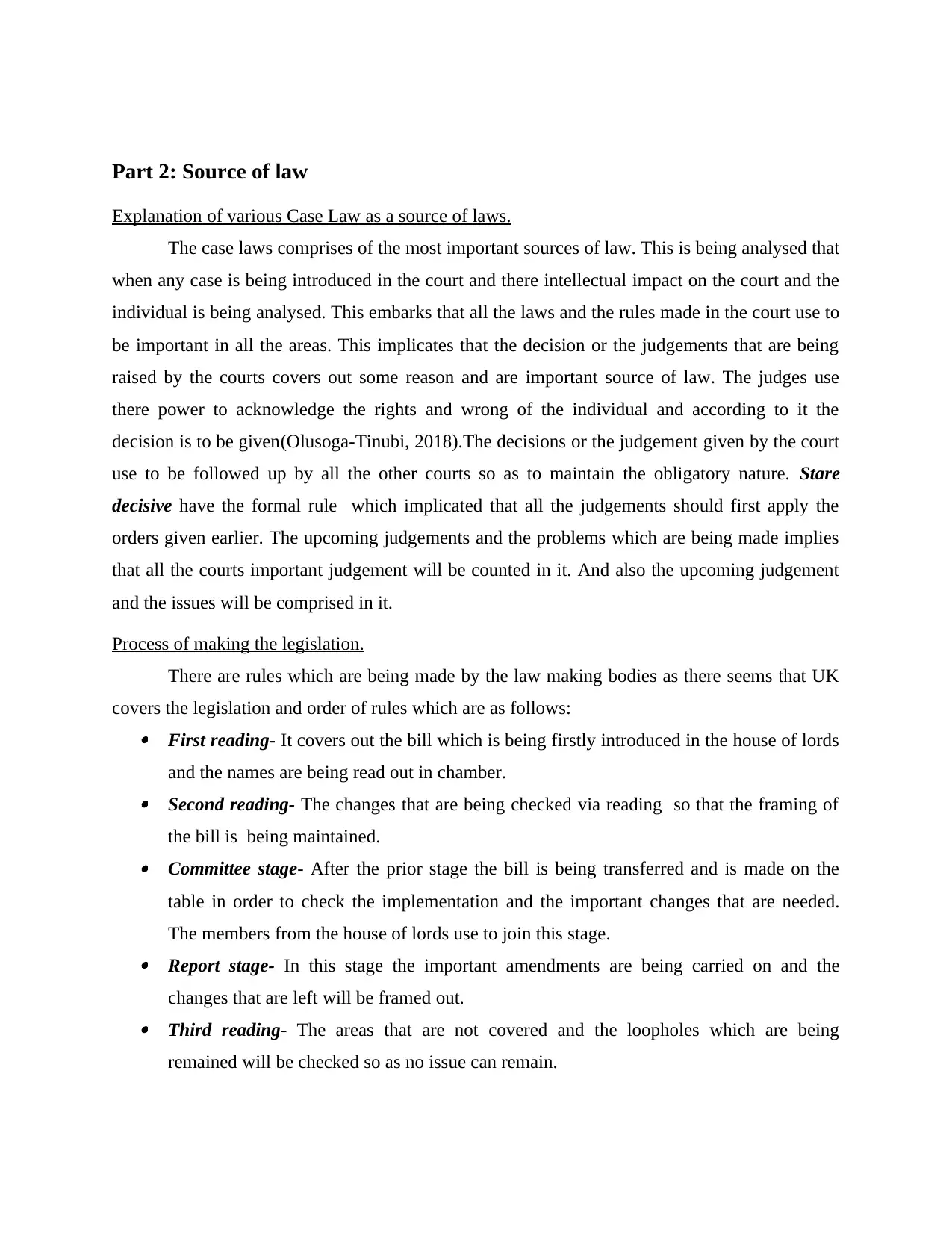
Part 2: Source of law
Explanation of various Case Law as a source of laws.
The case laws comprises of the most important sources of law. This is being analysed that
when any case is being introduced in the court and there intellectual impact on the court and the
individual is being analysed. This embarks that all the laws and the rules made in the court use to
be important in all the areas. This implicates that the decision or the judgements that are being
raised by the courts covers out some reason and are important source of law. The judges use
there power to acknowledge the rights and wrong of the individual and according to it the
decision is to be given(Olusoga-Tinubi, 2018).The decisions or the judgement given by the court
use to be followed up by all the other courts so as to maintain the obligatory nature. Stare
decisive have the formal rule which implicated that all the judgements should first apply the
orders given earlier. The upcoming judgements and the problems which are being made implies
that all the courts important judgement will be counted in it. And also the upcoming judgement
and the issues will be comprised in it.
Process of making the legislation.
There are rules which are being made by the law making bodies as there seems that UK
covers the legislation and order of rules which are as follows: First reading- It covers out the bill which is being firstly introduced in the house of lords
and the names are being read out in chamber. Second reading- The changes that are being checked via reading so that the framing of
the bill is being maintained. Committee stage- After the prior stage the bill is being transferred and is made on the
table in order to check the implementation and the important changes that are needed.
The members from the house of lords use to join this stage. Report stage- In this stage the important amendments are being carried on and the
changes that are left will be framed out. Third reading- The areas that are not covered and the loopholes which are being
remained will be checked so as no issue can remain.
Explanation of various Case Law as a source of laws.
The case laws comprises of the most important sources of law. This is being analysed that
when any case is being introduced in the court and there intellectual impact on the court and the
individual is being analysed. This embarks that all the laws and the rules made in the court use to
be important in all the areas. This implicates that the decision or the judgements that are being
raised by the courts covers out some reason and are important source of law. The judges use
there power to acknowledge the rights and wrong of the individual and according to it the
decision is to be given(Olusoga-Tinubi, 2018).The decisions or the judgement given by the court
use to be followed up by all the other courts so as to maintain the obligatory nature. Stare
decisive have the formal rule which implicated that all the judgements should first apply the
orders given earlier. The upcoming judgements and the problems which are being made implies
that all the courts important judgement will be counted in it. And also the upcoming judgement
and the issues will be comprised in it.
Process of making the legislation.
There are rules which are being made by the law making bodies as there seems that UK
covers the legislation and order of rules which are as follows: First reading- It covers out the bill which is being firstly introduced in the house of lords
and the names are being read out in chamber. Second reading- The changes that are being checked via reading so that the framing of
the bill is being maintained. Committee stage- After the prior stage the bill is being transferred and is made on the
table in order to check the implementation and the important changes that are needed.
The members from the house of lords use to join this stage. Report stage- In this stage the important amendments are being carried on and the
changes that are left will be framed out. Third reading- The areas that are not covered and the loopholes which are being
remained will be checked so as no issue can remain.
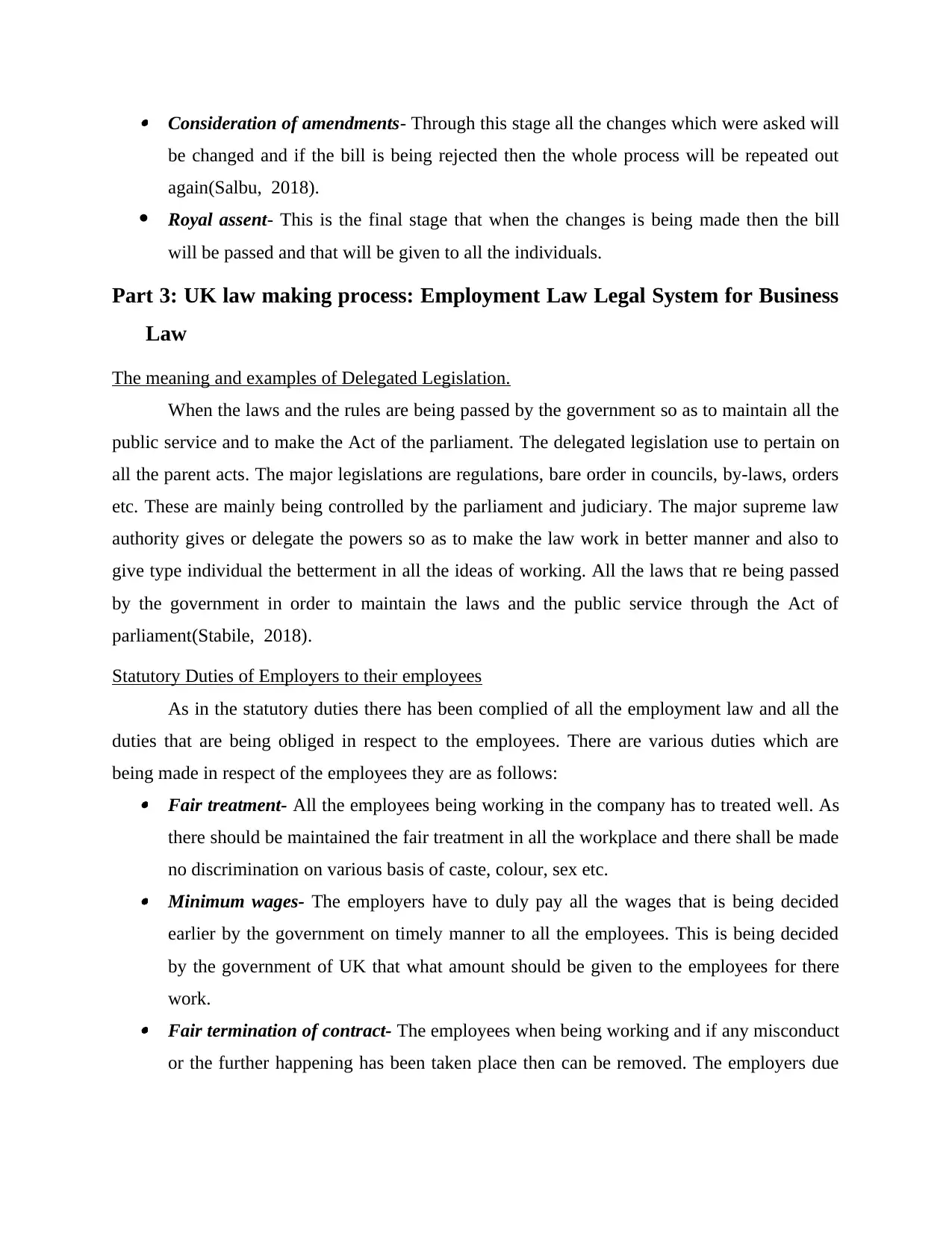
Consideration of amendments- Through this stage all the changes which were asked will
be changed and if the bill is being rejected then the whole process will be repeated out
again(Salbu, 2018).
Royal assent- This is the final stage that when the changes is being made then the bill
will be passed and that will be given to all the individuals.
Part 3: UK law making process: Employment Law Legal System for Business
Law
The meaning and examples of Delegated Legislation.
When the laws and the rules are being passed by the government so as to maintain all the
public service and to make the Act of the parliament. The delegated legislation use to pertain on
all the parent acts. The major legislations are regulations, bare order in councils, by-laws, orders
etc. These are mainly being controlled by the parliament and judiciary. The major supreme law
authority gives or delegate the powers so as to make the law work in better manner and also to
give type individual the betterment in all the ideas of working. All the laws that re being passed
by the government in order to maintain the laws and the public service through the Act of
parliament(Stabile, 2018).
Statutory Duties of Employers to their employees
As in the statutory duties there has been complied of all the employment law and all the
duties that are being obliged in respect to the employees. There are various duties which are
being made in respect of the employees they are as follows: Fair treatment- All the employees being working in the company has to treated well. As
there should be maintained the fair treatment in all the workplace and there shall be made
no discrimination on various basis of caste, colour, sex etc. Minimum wages- The employers have to duly pay all the wages that is being decided
earlier by the government on timely manner to all the employees. This is being decided
by the government of UK that what amount should be given to the employees for there
work. Fair termination of contract- The employees when being working and if any misconduct
or the further happening has been taken place then can be removed. The employers due
be changed and if the bill is being rejected then the whole process will be repeated out
again(Salbu, 2018).
Royal assent- This is the final stage that when the changes is being made then the bill
will be passed and that will be given to all the individuals.
Part 3: UK law making process: Employment Law Legal System for Business
Law
The meaning and examples of Delegated Legislation.
When the laws and the rules are being passed by the government so as to maintain all the
public service and to make the Act of the parliament. The delegated legislation use to pertain on
all the parent acts. The major legislations are regulations, bare order in councils, by-laws, orders
etc. These are mainly being controlled by the parliament and judiciary. The major supreme law
authority gives or delegate the powers so as to make the law work in better manner and also to
give type individual the betterment in all the ideas of working. All the laws that re being passed
by the government in order to maintain the laws and the public service through the Act of
parliament(Stabile, 2018).
Statutory Duties of Employers to their employees
As in the statutory duties there has been complied of all the employment law and all the
duties that are being obliged in respect to the employees. There are various duties which are
being made in respect of the employees they are as follows: Fair treatment- All the employees being working in the company has to treated well. As
there should be maintained the fair treatment in all the workplace and there shall be made
no discrimination on various basis of caste, colour, sex etc. Minimum wages- The employers have to duly pay all the wages that is being decided
earlier by the government on timely manner to all the employees. This is being decided
by the government of UK that what amount should be given to the employees for there
work. Fair termination of contract- The employees when being working and if any misconduct
or the further happening has been taken place then can be removed. The employers due
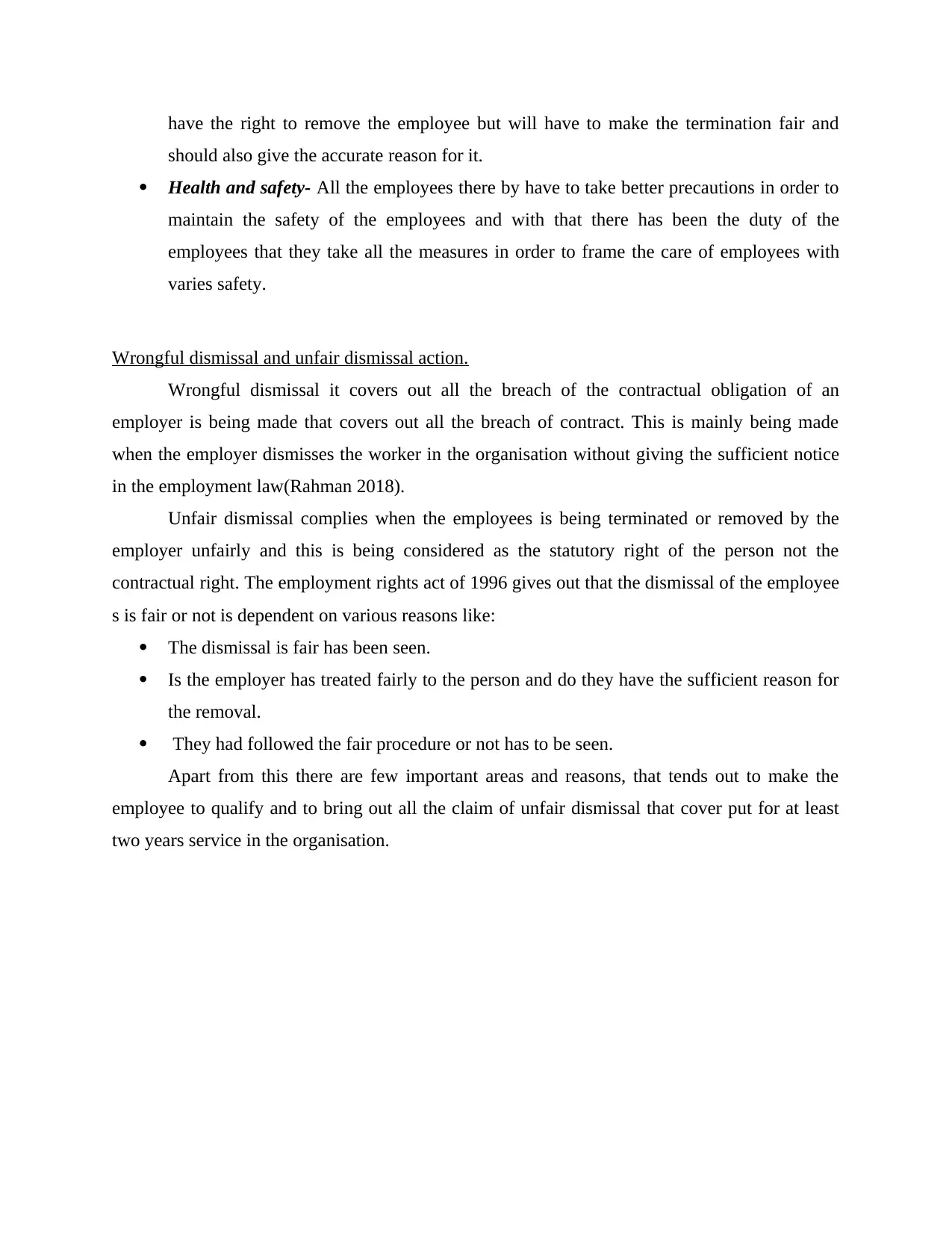
have the right to remove the employee but will have to make the termination fair and
should also give the accurate reason for it.
Health and safety- All the employees there by have to take better precautions in order to
maintain the safety of the employees and with that there has been the duty of the
employees that they take all the measures in order to frame the care of employees with
varies safety.
Wrongful dismissal and unfair dismissal action.
Wrongful dismissal it covers out all the breach of the contractual obligation of an
employer is being made that covers out all the breach of contract. This is mainly being made
when the employer dismisses the worker in the organisation without giving the sufficient notice
in the employment law(Rahman 2018).
Unfair dismissal complies when the employees is being terminated or removed by the
employer unfairly and this is being considered as the statutory right of the person not the
contractual right. The employment rights act of 1996 gives out that the dismissal of the employee
s is fair or not is dependent on various reasons like:
The dismissal is fair has been seen.
Is the employer has treated fairly to the person and do they have the sufficient reason for
the removal.
They had followed the fair procedure or not has to be seen.
Apart from this there are few important areas and reasons, that tends out to make the
employee to qualify and to bring out all the claim of unfair dismissal that cover put for at least
two years service in the organisation.
should also give the accurate reason for it.
Health and safety- All the employees there by have to take better precautions in order to
maintain the safety of the employees and with that there has been the duty of the
employees that they take all the measures in order to frame the care of employees with
varies safety.
Wrongful dismissal and unfair dismissal action.
Wrongful dismissal it covers out all the breach of the contractual obligation of an
employer is being made that covers out all the breach of contract. This is mainly being made
when the employer dismisses the worker in the organisation without giving the sufficient notice
in the employment law(Rahman 2018).
Unfair dismissal complies when the employees is being terminated or removed by the
employer unfairly and this is being considered as the statutory right of the person not the
contractual right. The employment rights act of 1996 gives out that the dismissal of the employee
s is fair or not is dependent on various reasons like:
The dismissal is fair has been seen.
Is the employer has treated fairly to the person and do they have the sufficient reason for
the removal.
They had followed the fair procedure or not has to be seen.
Apart from this there are few important areas and reasons, that tends out to make the
employee to qualify and to bring out all the claim of unfair dismissal that cover put for at least
two years service in the organisation.
Secure Best Marks with AI Grader
Need help grading? Try our AI Grader for instant feedback on your assignments.
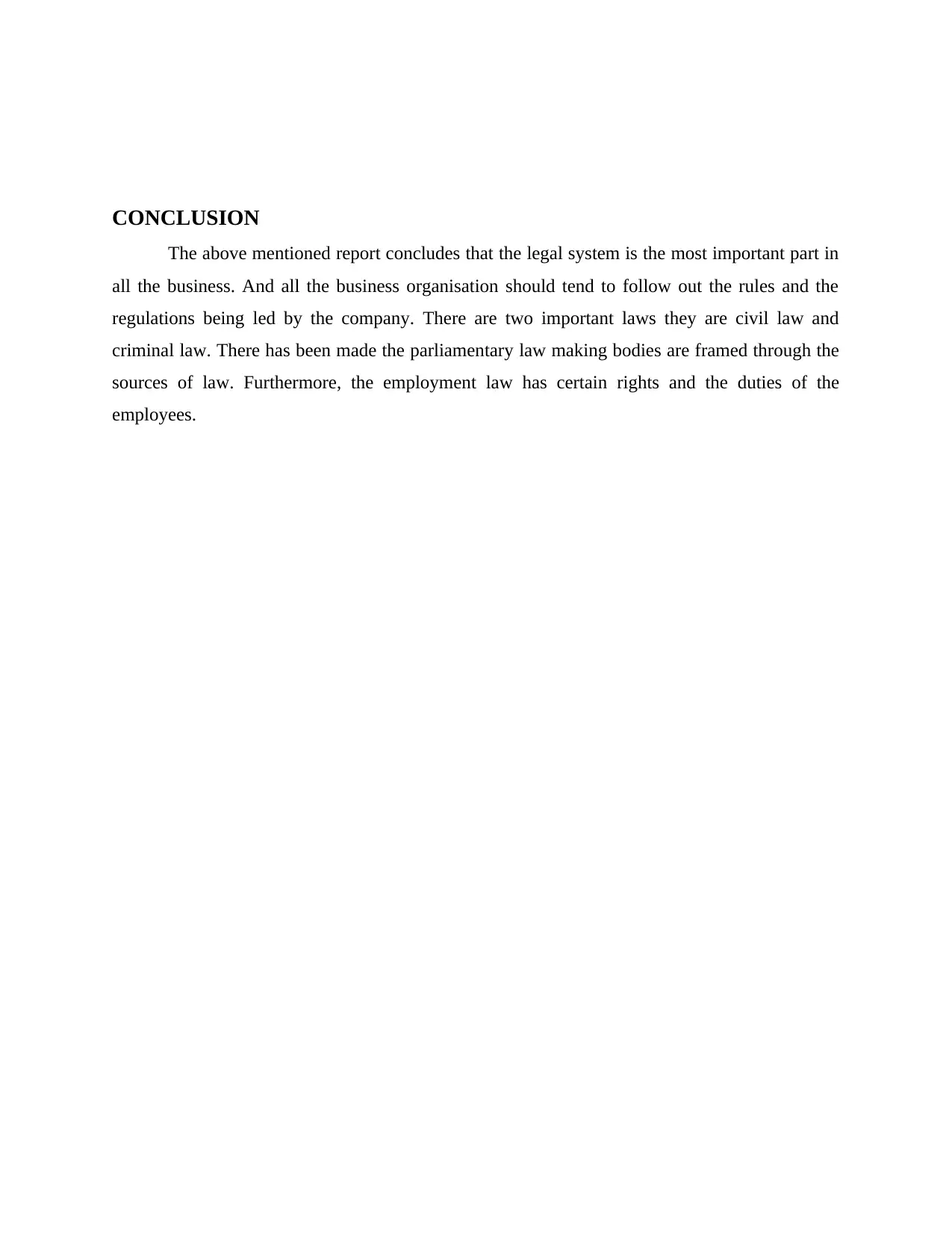
CONCLUSION
The above mentioned report concludes that the legal system is the most important part in
all the business. And all the business organisation should tend to follow out the rules and the
regulations being led by the company. There are two important laws they are civil law and
criminal law. There has been made the parliamentary law making bodies are framed through the
sources of law. Furthermore, the employment law has certain rights and the duties of the
employees.
The above mentioned report concludes that the legal system is the most important part in
all the business. And all the business organisation should tend to follow out the rules and the
regulations being led by the company. There are two important laws they are civil law and
criminal law. There has been made the parliamentary law making bodies are framed through the
sources of law. Furthermore, the employment law has certain rights and the duties of the
employees.
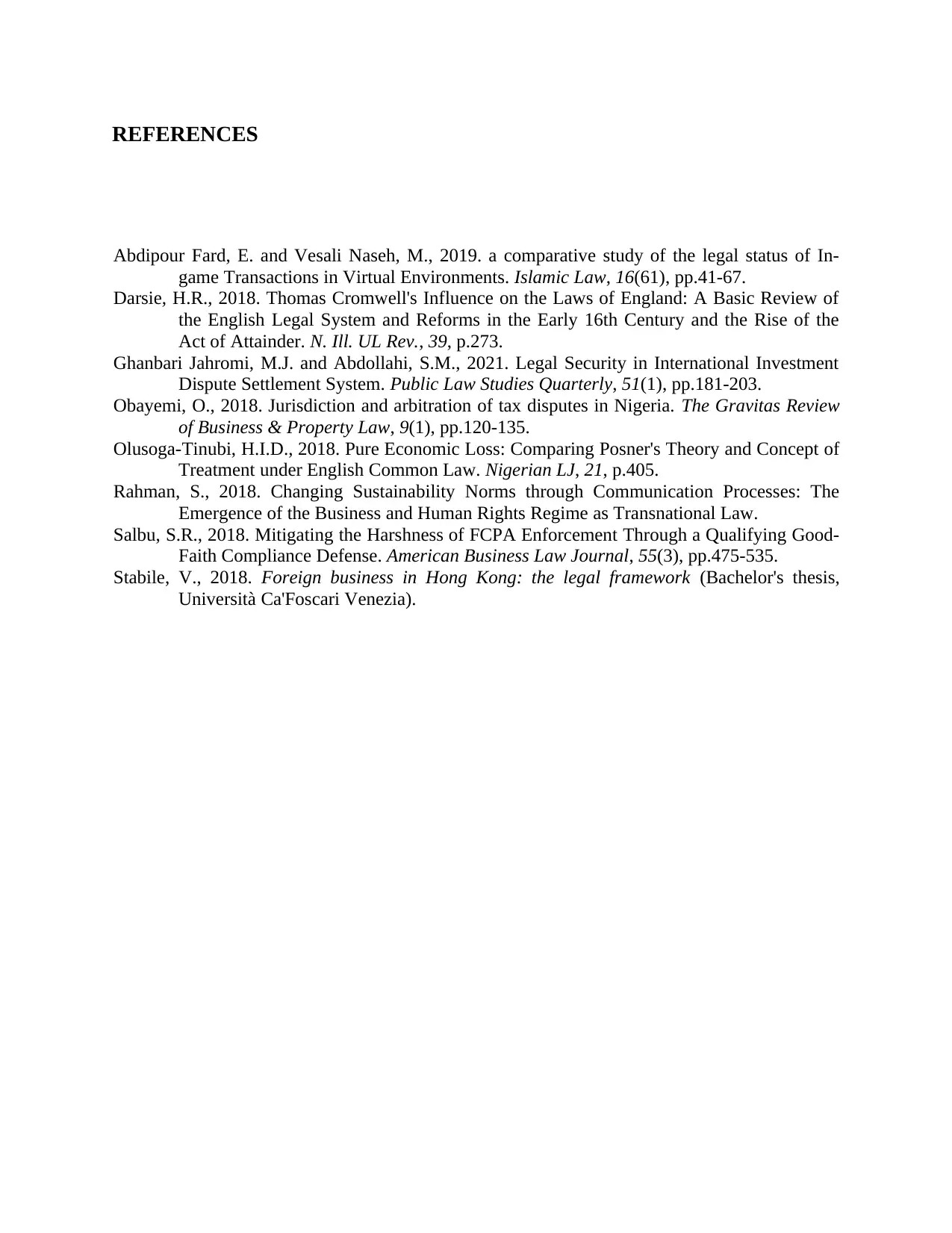
REFERENCES
Abdipour Fard, E. and Vesali Naseh, M., 2019. a comparative study of the legal status of In-
game Transactions in Virtual Environments. Islamic Law, 16(61), pp.41-67.
Darsie, H.R., 2018. Thomas Cromwell's Influence on the Laws of England: A Basic Review of
the English Legal System and Reforms in the Early 16th Century and the Rise of the
Act of Attainder. N. Ill. UL Rev., 39, p.273.
Ghanbari Jahromi, M.J. and Abdollahi, S.M., 2021. Legal Security in International Investment
Dispute Settlement System. Public Law Studies Quarterly, 51(1), pp.181-203.
Obayemi, O., 2018. Jurisdiction and arbitration of tax disputes in Nigeria. The Gravitas Review
of Business & Property Law, 9(1), pp.120-135.
Olusoga-Tinubi, H.I.D., 2018. Pure Economic Loss: Comparing Posner's Theory and Concept of
Treatment under English Common Law. Nigerian LJ, 21, p.405.
Rahman, S., 2018. Changing Sustainability Norms through Communication Processes: The
Emergence of the Business and Human Rights Regime as Transnational Law.
Salbu, S.R., 2018. Mitigating the Harshness of FCPA Enforcement Through a Qualifying Good‐
Faith Compliance Defense. American Business Law Journal, 55(3), pp.475-535.
Stabile, V., 2018. Foreign business in Hong Kong: the legal framework (Bachelor's thesis,
Università Ca'Foscari Venezia).
Abdipour Fard, E. and Vesali Naseh, M., 2019. a comparative study of the legal status of In-
game Transactions in Virtual Environments. Islamic Law, 16(61), pp.41-67.
Darsie, H.R., 2018. Thomas Cromwell's Influence on the Laws of England: A Basic Review of
the English Legal System and Reforms in the Early 16th Century and the Rise of the
Act of Attainder. N. Ill. UL Rev., 39, p.273.
Ghanbari Jahromi, M.J. and Abdollahi, S.M., 2021. Legal Security in International Investment
Dispute Settlement System. Public Law Studies Quarterly, 51(1), pp.181-203.
Obayemi, O., 2018. Jurisdiction and arbitration of tax disputes in Nigeria. The Gravitas Review
of Business & Property Law, 9(1), pp.120-135.
Olusoga-Tinubi, H.I.D., 2018. Pure Economic Loss: Comparing Posner's Theory and Concept of
Treatment under English Common Law. Nigerian LJ, 21, p.405.
Rahman, S., 2018. Changing Sustainability Norms through Communication Processes: The
Emergence of the Business and Human Rights Regime as Transnational Law.
Salbu, S.R., 2018. Mitigating the Harshness of FCPA Enforcement Through a Qualifying Good‐
Faith Compliance Defense. American Business Law Journal, 55(3), pp.475-535.
Stabile, V., 2018. Foreign business in Hong Kong: the legal framework (Bachelor's thesis,
Università Ca'Foscari Venezia).

1 out of 10
![[object Object]](/_next/static/media/star-bottom.7253800d.svg)


